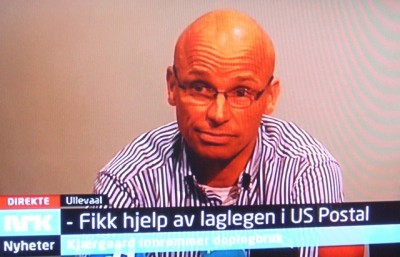Norwegian cycling has been on a roll lately, but the sport careened into the gutter on Tuesday when the sports chief of Norway’s own cycling association (Norges Cykleforbund), Steffen Kjærgaard, admitted he was guilty of doping himself when he rode professionally.

Kjærgaard admitted he had taken illegal performance-enhancing drugs before quitting in 2003. Kjærgaard, now age 39, cycled for the US Postal Service team from 2000 to 2003 and said at a press conference in Oslo on Tuesday that he’d received help with his doping from the US Postal Service’s team doctor.
That’s the same team for which disgraced former US cycling star Lance Armstrong also rode, and Armstrong was the captain of the team when Kjærgaard was a member. Armstrong won the overall Tour de France both in 2000 and 2001, when Kjærgaard placed 89th and 101st respectively.
Armstrong was formally stripped of all his Tour de France victories and ordered to repay award money this week, after being found guilty of doping. Kjærgaard said he finally decided to admit his own doping as well. He said he felt “just terrible” about it and was tired of keeping his doping secret for nearly 15 years. Most of the doping occurred, he said, 13-14 years ago.
“I’ve served up so many lies over the years,” said Kjærgaard, clearly fighting back tears at the midday press conference carried live on national TV by Norwegian Broadcasting (NRK) and other media outlets. He said he thought he’d take his doping secret “to my grave,” but he clearly changed his mind amidst all the recent disclosures about Armstrong.
“What’s come forward in the last two weeks (through the US Anti-Doping Agency’s report that felled Armstrong) has made me feel that it’s necessary to dig up my own dark lies from the past,” said Kjærgaard, who rode for Norway during the Summer Olympics in Barcelona in 1992. He then proceeded to chronologically recount his professional cycling career, which began in 1996.
‘Dirty game’
During its first two years (1996-1998), Kjærgaard said he began “to gain an understanding of the dirty game I was quite unprepared for, after having been an amateur in Norway.” Then he felt he had to make a choice: “If I wanted to be in the race further,” he said, he had to begin doping himself.
He said he contacted a Belgian doctor in 1999 for help with health questions and to evaluate the risk of getting caught. His doping, he said, believed to involve mostly EPO and cortisone, led to “a good season, which led to me becoming part of the US Postal Service team.”
He then became part of the US Postal Service team’s “now well-known regime,” he said, and stayed with them for around three seasons. He claimed he had “poor response from the micro doses,” however, and chose to stop. He then became sports chief for the Norwegian cycling association and said it was “tough” to carry on new anti-doping work when he carried such a secret about his own doping.
Living a lie
“I’ve had a big problem with my own conscience,” he said. “I haven’t managed to carry the lie, that’s why I’m sitting here today.” He also said his disclosure was tough on his family, friends and former teammates.
Harald Tiedemann Hansen, president of the cycling group, sat next to Kjærgaard at the press conference and said he and his colleagues were “incredibly disappointed. This is a breach of trust. We are, though, relieved that Steffen has come forward with the truth.” Hansen, who was told about Kjærgaard’s doping on Monday, told NRK that “we made two demands: That we wanted this information to get out to everyone, and that he contact Antidoping Norway.”
Also disappointed were other Norwegian cyclists, whom Kjærgaard called before making his announcement. Among them were Kurt Asle Arvesen and Gunn-Rita Dahle Flesjå.
“I had thought for the longest time that we’d be spared this kind of revelation among Norwegian cyclists,” Arvesen told NRK, adding that he told Kjærgaard he was “very disappointed.” Arvesen said he thinks Kjærgaard’s doping admission is “absolutely damaging” for the reputation of Norwegian cycling.
“Kjærgaard has been the national team’s chief for six years, and he’s a mentor for many,” Arvesen said. “This has been a long process and now we’ve hit bottom. Maybe we can now begin to concentrate on what we should: training and races.”
Views and News from Norway/Nina Berglund
Please support our news service. Readers in Norway can use our donor account. Our international readers can click on our “Donate” button:

